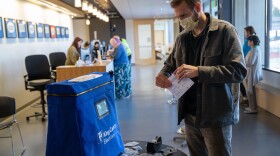
Pam Fessler
Pam Fessler is a correspondent on NPR's National Desk, where she covers poverty, philanthropy, and voting issues.
In her reporting at NPR, Fessler does stories on homelessness, hunger, affordable housing, and income inequality. She reports on what non-profit groups, the government, and others are doing to reduce poverty and how those efforts are working. Her poverty reporting was recognized with a 2011 First Place National Headliner Award.
Fessler also covers elections and voting, including efforts to make voting more accessible, accurate, and secure. She has done countless stories on everything from the debate over state voter identification laws to Russian hacking attempts and long lines at the polls.
After the Sept. 11 terrorist attacks, Fessler became NPR's first Homeland Security correspondent. For seven years, she reported on efforts to tighten security at ports, airports, and borders, and the debate over the impact on privacy and civil rights. She also reported on the government's response to Hurricane Katrina, The 9/11 Commission Report, Social Security, and the Census. Fessler was one of NPR's White House reporters during the Clinton and Bush administrations.
Before becoming a correspondent, Fessler was the acting senior editor on the Washington Desk and NPR's chief election editor. She coordinated all network coverage of the presidential, congressional, and state elections in 1996 and 1998. In her more than 25 years at NPR, Fessler has also been deputy Washington Desk editor and Midwest National Desk editor.
Earlier in her career, she was a senior writer at Congressional Quarterly magazine. Fessler worked there for 13 years as both a reporter and editor, covering tax, budget, and other news. She also worked as a budget specialist at the U.S. Office of Management and Budget, and was a reporter at The Record newspaper in Hackensack, New Jersey.
Fessler has a master's of public administration from the Maxwell School at Syracuse University and a bachelor's degree from Douglass College in New Jersey.
-
This week's primary in Wisconsin, which produced long lines of voters waiting in protective gear to cast their ballots, is a dire warning of what could lie ahead.
-
Full-time election workers in New York, New Jersey and Washington, DC have fallen will with COVID-19 all while trying to make plans for carrying out upcoming elections under challenging conditions.
-
Many food banks and homeless shelters depend on volunteers. But fewer are showing up at a time when the need for these services is skyrocketing.
-
The coronavirus relief package includes a number of provisions to help low-income Americans. But advocates for the poor say it's only a first step.
-
The money is far less than the $4 billion some Democrats had wanted. It would allow states to expand mail-in and early voting, online voter registration and help secure in-person voting sites.
-
There is growing interest in expanding voting by mail, at least for the remainder of 2020, in order to keep poll workers and voters safe. But there are many challenges to pulling it off.
-
As the number of confirmed coronavirus cases continues to climb, election officials and candidates are weighing how to make sure the political process doesn't become the next casualty of the virus.
-
With concern growing about the spread of the coronavirus, officials in a number of Super Tuesday states are taking extra precautions to assure voters that it's safe to go to the polls.
-
State officials are eager to emphasize the reliability of their equipment following the Iowa caucus debacle, where a flawed app delayed the reporting of accurate results for weeks.
-
An outside group is blanketing the nation with official-looking exhortations to register to vote. Actual elections officials don't agree whether that's ultimately helpful or harmful.









